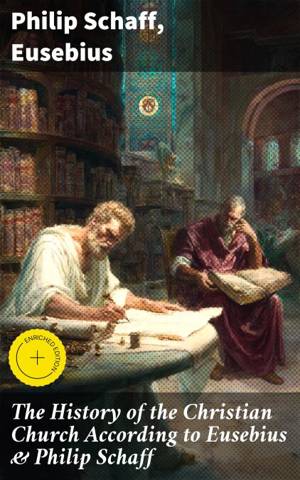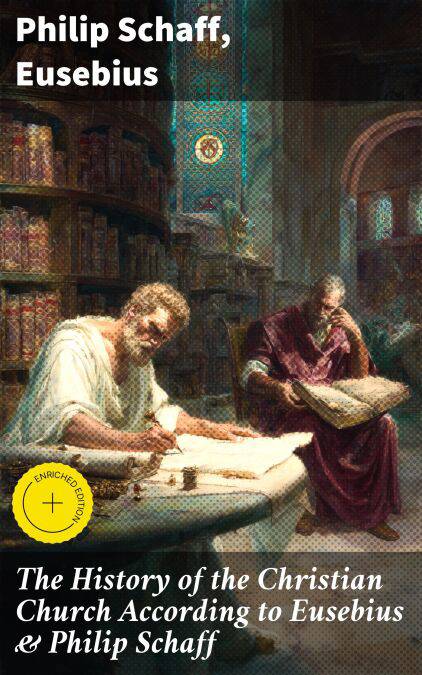
- Afhalen na 1 uur in een winkel met voorraad
- Gratis thuislevering in België vanaf € 30
- Ruim aanbod met 7 miljoen producten
- Afhalen na 1 uur in een winkel met voorraad
- Gratis thuislevering in België vanaf € 30
- Ruim aanbod met 7 miljoen producten
Zoeken
The History of the Christian Church According to Eusebius & Philip Schaff E-BOOK
Enriched edition. The Complete 8 Volume Edition of Schaff's Church History & The Eusebius' History of the Early Christianity
Philip Schaff, Eusebius
E-book | Engels
€ 1,99
+ 1 punten
Uitvoering
Omschrijving
The History of the Christian Church According to Eusebius & Philip Schaff is an illuminating anthology that captures the essence of early Christian history through a rich tapestry of narratives and analyses. This collection presents a panoramic view of the formative periods of Christianity, including pivotal events, influential figures, and transformative theological developments. By weaving together diverse literary styles, from Eusebius's seminal historical accounts to Schaff's comprehensive commentaries, this anthology invites readers to explore the evolution of Christian thought and practice across centuries. Notable pieces highlight the resilience and complexity inherent in the development of early Christian communities, offering valuable insights into their enduring legacy. The anthology boasts contributions from Eusebius, renowned as the 'Father of Church History,' and Philip Schaff, a preeminent 19th-century theologian and historian. Eusebius's pioneering chronicles provide a firsthand glimpse into the early Church's trials and triumphs, while Schaff's modern interpretations and contextual understanding bridge historical gaps. Together, they traverse ecclesiastical movements and doctrinal shifts, capturing the vibrancy of Christian history during key periods. Their combined efforts culminate in a collection that transcends time, reflecting the rich past and its impact on contemporary theological discourse. For readers seeking a comprehensive exploration of Christian heritage, this anthology offers an indispensable resource. The unique pairing of Eusebius and Schaff allows for a dialogue that defies temporal boundaries, enriching the reader's understanding of the multifaceted Christian tradition. This volume is not just an academic treasure but a scholarly invitation to engage deeply with the narratives that have shaped Western religious and cultural landscapes. It encourages readers to reflect on the profound interplay between historical context and timeless faith.
In this enriched edition, we have carefully created added value for your reading experience:
- A succinct Introduction situates the work's timeless appeal and themes.
- The Synopsis outlines the central plot, highlighting key developments without spoiling critical twists.
- A detailed Historical Context immerses you in the era's events and influences that shaped the writing.
- A thorough Analysis dissects symbols, motifs, and character arcs to unearth underlying meanings.
- Reflection questions prompt you to engage personally with the work's messages, connecting them to modern life.
- Hand‐picked Memorable Quotes shine a spotlight on moments of literary brilliance.
- Interactive footnotes clarify unusual references, historical allusions, and archaic phrases for an effortless, more informed read.
In this enriched edition, we have carefully created added value for your reading experience:
- A succinct Introduction situates the work's timeless appeal and themes.
- The Synopsis outlines the central plot, highlighting key developments without spoiling critical twists.
- A detailed Historical Context immerses you in the era's events and influences that shaped the writing.
- A thorough Analysis dissects symbols, motifs, and character arcs to unearth underlying meanings.
- Reflection questions prompt you to engage personally with the work's messages, connecting them to modern life.
- Hand‐picked Memorable Quotes shine a spotlight on moments of literary brilliance.
- Interactive footnotes clarify unusual references, historical allusions, and archaic phrases for an effortless, more informed read.
Specificaties
Betrokkenen
- Auteur(s):
- Uitgeverij:
Inhoud
- Aantal bladzijden:
- 10150
- Taal:
- Engels
Eigenschappen
- Productcode (EAN):
- 8596547775188
- Verschijningsdatum:
- 10/12/2023
- Uitvoering:
- E-book
- Beveiligd met:
- Digital watermarking
- Formaat:
- ePub

Alleen bij Standaard Boekhandel
+ 1 punten op je klantenkaart van Standaard Boekhandel
Beoordelingen
We publiceren alleen reviews die voldoen aan de voorwaarden voor reviews. Bekijk onze voorwaarden voor reviews.







